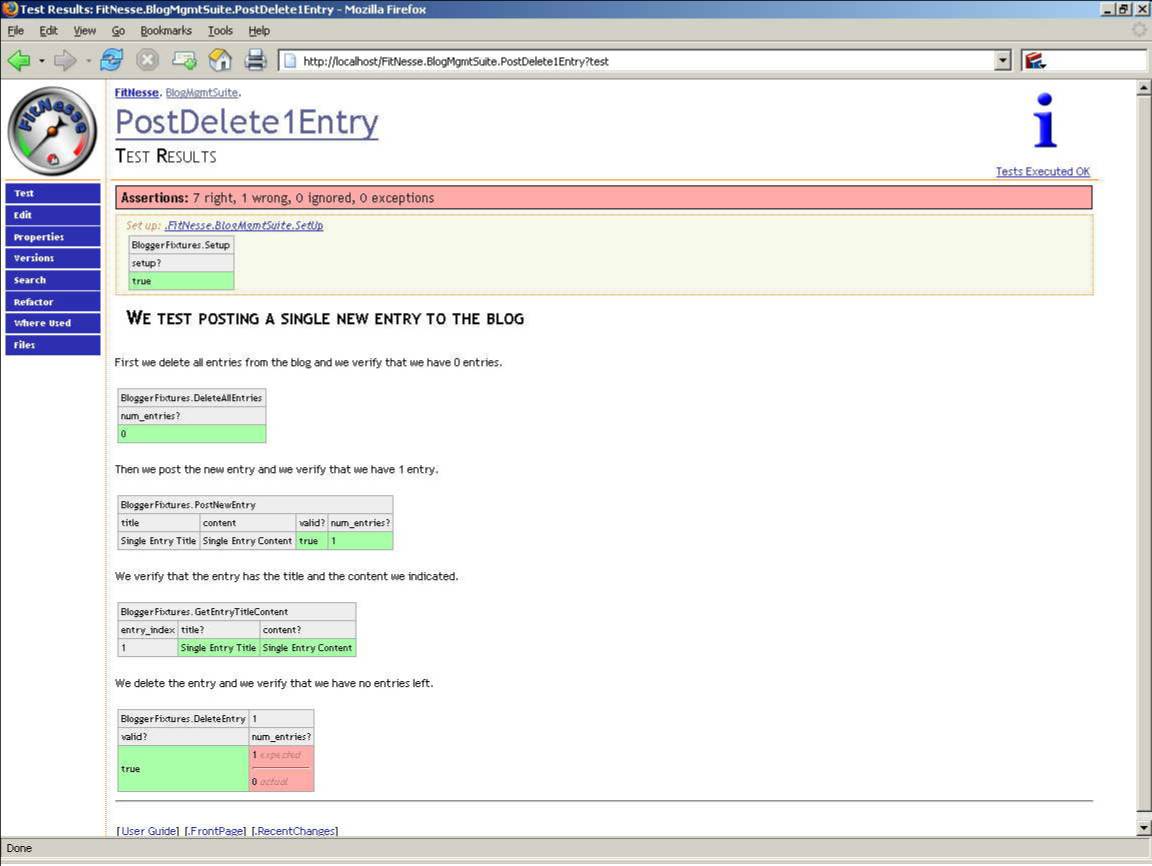Resources:
py.test home page: http://codespeak.net/py/current/doc/test.html
py lib home page: http://codespeak.net/py/current/doc/why_py.html
py.test home page: http://codespeak.net/py/current/doc/test.html
py lib home page: http://codespeak.net/py/current/doc/why_py.html
class TestSort:
def setup_method(self, method):
self.alist = [5, 2, 3, 1, 4]
def test_ascending_sort(self):
self.alist.sort()
assert self.alist == [1, 2, 3, 4, 5]
# py.test -v test_sort.py
inserting into sys.path: /usr/local/dist-py
============================= test process starts =============================
testing-mode: inprocess
executable : /usr/local/bin/python (2.4.0-final-0)
using py lib: /usr/local/dist-py/py
initial testconfig 0: /usr/local/dist-py/py/test/defaultconfig.py/.
===============================================================================
0.000 ok test_sort.py:5 TestSort.test_ascending_sort()
0.000 ok test_sort.py:9 TestSort.test_custom_sort()
0.000 ok test_sort.py:23 TestSort.test_sort_reverse()
0.007 ok test_sort.py:28 TestSort.test_sort_exception()
Resources:
PyLint: http://www.logilab.org/projects/pylint
coverage: http://www.nedbatchelder.com/code/modules/coverage.html
Brian Marick's "How to misuse code coverage": http://www.testing.com/writings/coverage.pdf
buildbot: http://buildbot.sourceforge.net
PyLint: http://www.logilab.org/projects/pylint
coverage: http://www.nedbatchelder.com/code/modules/coverage.html
Brian Marick's "How to misuse code coverage": http://www.testing.com/writings/coverage.pdf
buildbot: http://buildbot.sourceforge.net
Resources:
JUnitPerf: http://www.clarkware.com/software/JUnitPerf.html
pyUnitPerf: http://sourceforge.net/projects/pyunitperf/
Continuous performance testing article: http://www.javapronews.com/javapronews-47-20030721ContinuousPerformanceTestingwithJUnitPerf.html
JUnitPerf: http://www.clarkware.com/software/JUnitPerf.html
pyUnitPerf: http://sourceforge.net/projects/pyunitperf/
Continuous performance testing article: http://www.javapronews.com/javapronews-47-20030721ContinuousPerformanceTestingwithJUnitPerf.html
from unittest import TestCase, TestSuite, TextTestRunner
from LoadTest import LoadTest
from TimedTest import TimedTest
import time
class ExampleTestCase(TestCase):
def __init__(self, name):
TestCase.__init__(self, name)
def testOneSecondResponse(self):
time.sleep(1)
class ExampleTimedTest:
def __init__(self):
self.toleranceInSec = 0.05
def make1SecondResponseTimedTest(self):
"""
Decorates a one second response time test as a
timed test with a maximum elapsed time of 1 second
"""
maxElapsedTimeInSec = 1 + self.toleranceInSec
testCase = ExampleTestCase("testOneSecondResponse")
timedTest = TimedTest(testCase, maxElapsedTimeInSec)
return timedTest
testOneSecondResponse (ExampleTestCase.ExampleTestCase) ... ok
TimedTest (WAITING): testOneSecondResponse (ExampleTestCase.ExampleTestCase): 1.
0 sec.
FAIL
======================================================================
FAIL: testOneSecondResponse (ExampleTestCase.ExampleTestCase)
----------------------------------------------------------------------
AssertionFailedError: Maximum elapsed time exceeded! Expected 0.95 sec., but was
1.0 sec.
----------------------------------------------------------------------
Ran 1 test in 1.000s
FAILED (failures=1)
def main_loop(self):
self.test = Test.Test('EXECUTABLE.' + self.__class__._name_)
try:
# start timer
self.timer.start("total")
# generate data
if self.test.config.isset("generate"):
self.generate_data()
if self.test.config.isset("norun"):
self.timer.stop("total")
return
# backup
self.backup()
# restore
self.restore()
# validate
self.restore_validate()
# end timer
self.timer.stop("total")
self.test.add_memo("test took times of: %s" % self.timer.timestr())
except:
# If we have an uncaught exception here we should log this test as INVALID
(exceptiontype, exceptionvalue, exceptiontrace) = sys.exc_info()
msg = "Uncaught exception %s in basic::main_loop" % str(exceptiontype)
self.test.test({"message": msg})
self.test.set_passfail('INVALID')
self.test.log_result()
Sample command sent to STAX Service machine:
STAF mgmt1 STAX EXECUTE FILE /QA/STAF/stax_jobs/client_test_harness.xml MACHINE mgmt1 SCRIPTFILE /QA/STAF/stax_jobs/global_vars.py JOBNAME "CLIENT_TEST_HARNESS" SCRIPT "VERSION='1.0.2'" CLEARLOGS EnabledSample STAX job file:
<script>
HFSADDR = 'dpe03'
HARNESS_TIMER_DURATION = '60m'
clients_os = {'neon':'unix',
'sunv2401':'unix',
'ibmp6151':'unix',
'copper':'win',
'dellwin2ks2':'win'
}
pylts_path = {'unix': '/data01/qa/pylts',
'win' : 'C:/qa/pylts'
}
tests_unix = [
[ 'unix_perms', 'avtar/snapup_unix_perms.py' ],
[ 'commonality', 'avtar/snapup_commonality.py' ],
[ 'weird_names', 'avtar/snapup_weird_names.py' ],
]
tests_win = [
[ 'srv_unicode_names', 'avtar/srv_unicode_names.py' ],
]
</script>
<defaultcall function="Main"/>
<function name="Main">
<sequence>
<import machine="'neon'" file="'/vortex/pub/QA/STAF/stax_jobs/log_result.xml'"/>
<call function="'ClientTestHarness'">
[clients_os, pylts_path, tests_unix, tests_win]
</call>
</sequence>
</function>
<function name="ClientTestHarness">
<function-list-args>
<function-required-arg name='clients_os'/>
<function-required-arg name='pylts_path'/>
<function-required-arg name='tests_unix'/>
<function-required-arg name='tests_win'/>
<function-other-args name='args'/>
</function-list-args>
<paralleliterate var="machine" in="clients_os.keys()">
<sequence>
<script>
os_type = clients_os[machine]
tests = {}
if os_type == 'unix':
tests = tests_unix
if os_type == 'win':
tests = tests_win
</script>
<iterate var="test" in="tests">
<sequence>
<script>
test_name = machine + "_" + test[0]
</script>
<testcase name="test_name">
<sequence>
<script>
cmdline = pylts_path[os_type] + "/" + test[1] + " --hfsaddr=%s" % HFSADDR
</script>
<timer duration = "HARNESS_TIMER_DURATION">
<process>
<location>machine</location>
<command>'python'</command>
<parms>cmdline</parms>
<stderr mode="'stdout'" />
<returnstdout />
</process>
</timer>
<call function="'LogResult'">machine</call>
</sequence>
</testcase>
</sequence>
</iterate>
</sequence>
</paralleliterate>
</function>
</stax>
Resources:
FitNesse home page: http://www.fitnesse.org
FitNesse fixtures: http://fitnesse.org/FitNesse.WritingAcceptanceTests
PyFIT available in the files section of http://groups.yahoo.com/group/fitnesse
FitNesse home page: http://www.fitnesse.org
FitNesse fixtures: http://fitnesse.org/FitNesse.WritingAcceptanceTests
PyFIT available in the files section of http://groups.yahoo.com/group/fitnesse
Resources:
FitNesse ColumnFixture: http://fitnesse.org/FitNesse.ColumnFixture
FitNesse ColumnFixture: http://fitnesse.org/FitNesse.ColumnFixture
Resources:
FitNesse RowFixture: http://fitnesse.org/FitNesse.RowFixture
FitNesse RowFixture: http://fitnesse.org/FitNesse.RowFixture
Resources:
mechanize: http://wwwsearch.sourceforge.net/mechanize
webunit: http://mechanicalcat.net/tech/webunit
PBP: http://pbp.berlios.de
Twill: http://darcs.idyll.org/~t/projects/twill/README.html
MaxQ: http://maxq.tigris.org
Selenium: http://selenium.thoughtworks.com/index.html
Pamie: http://pamie.sourceforge.net
Jssh: http://www.croczilla.com/jssh
Watir: http://rubyforge.org/projects/wtr
mechanize: http://wwwsearch.sourceforge.net/mechanize
webunit: http://mechanicalcat.net/tech/webunit
PBP: http://pbp.berlios.de
Twill: http://darcs.idyll.org/~t/projects/twill/README.html
MaxQ: http://maxq.tigris.org
Selenium: http://selenium.thoughtworks.com/index.html
Pamie: http://pamie.sourceforge.net
Jssh: http://www.croczilla.com/jssh
Watir: http://rubyforge.org/projects/wtr
Resources:
TCPWatch: http://hathawaymix.org/Software/TCPWatch
Ian Bicking's script generator: http://svn.colorstudy.com/home/ianb/webtest_experiement/tcpwatch_scriptgen.py
TCPWatch: http://hathawaymix.org/Software/TCPWatch
Ian Bicking's script generator: http://svn.colorstudy.com/home/ianb/webtest_experiement/tcpwatch_scriptgen.py
Resources:
Selenium development page: http://confluence.public.thoughtworks.org/display/SEL/Home
Selenium Subversion repository: svn://selenium.codehaus.org/selenium/scm/trunk
Ian Bicking's post on Selenium: http://blog.ianbicking.org/starting-with-selenium.html
Selenium development page: http://confluence.public.thoughtworks.org/display/SEL/Home
Selenium Subversion repository: svn://selenium.codehaus.org/selenium/scm/trunk
Ian Bicking's post on Selenium: http://blog.ianbicking.org/starting-with-selenium.html
Resources:
pyGUIUnit: http://pyguiunit.sourceforge.net
wxMock: http://groups-beta.google.com/group/extreme-python/browse_thread/thread/07358638970fee03/cfe312fea27b75c9?tvc=2#cfe312fea27b75c9
Marathon: http://marathonman.sourceforge.net
pyGUIUnit: http://pyguiunit.sourceforge.net
wxMock: http://groups-beta.google.com/group/extreme-python/browse_thread/thread/07358638970fee03/cfe312fea27b75c9?tvc=2#cfe312fea27b75c9
Marathon: http://marathonman.sourceforge.net
Resources:
Tim Bray post on Dynamic Java: http://www.tbray.org/ongoing/When/200x/2004/12/08/DynamicJava
TestMaker: http://pushtotest.com/Downloads/downloadtmdoc.html
Marathon: http://marathonman.sourceforge.net
The Grinder v3: http://grinder.sourceforge.net/g3/whats-new.html
HttpUnit: http://httpunit.sourceforge.net/index.html
Tim Bray post on Dynamic Java: http://www.tbray.org/ongoing/When/200x/2004/12/08/DynamicJava
TestMaker: http://pushtotest.com/Downloads/downloadtmdoc.html
Marathon: http://marathonman.sourceforge.net
The Grinder v3: http://grinder.sourceforge.net/g3/whats-new.html
HttpUnit: http://httpunit.sourceforge.net/index.html
Resources:
Bret Pettichord's "Homebrew test automation" class notes:
http://www.io.com/%7Ewazmo/papers/homebrew_test_automation_200409.pdf
Danny Faught and James Bach: "Not your father's test automation"
(go to http://www.stickyminds.com in the Articles section)
Bret Pettichord's "Homebrew test automation" class notes:
http://www.io.com/%7Ewazmo/papers/homebrew_test_automation_200409.pdf
Danny Faught and James Bach: "Not your father's test automation"
(go to http://www.stickyminds.com in the Articles section)
